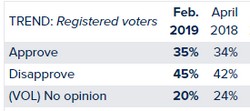After one year in office, New Jersey Governor Phil Muphy’s disapproval rating has risen 12 points, according to a recent report published by the University’s Polling Institute last Tuesday, Feb. 12.
Support for Murphy in polling numbers have cooled off from where they were in April 2018.
While his approval rating remains steady at around 43 percent, his disapproval rating has risen from 28 percent to 40 percent, according to the Institute’s report.
Murphy, a former Goldman Sachs President and Finance Chair of the Democratic National Committee, has also experienced a significant increase in disapproval ratings among political independents, from 33 percent to 43 percent.
Although Democrats largely approve of his performance, at 66 percent approval compared to just 9 percent disapproval, 25 percent say they still do not have an opinion of the governor.
“The most troubling result may be the large number of his fellow Democrats who continue to take a wait-and-see attitude,” said Patrick Murray, Director of the Monmouth University Polling Institute.
“It seems he has yet to score a defining win with his base despite spending a significant amount of energy pushing a progressive agenda,” he added.
Property taxes were found to be the most important issue facing New Jersey residents by far, with 45 percent of those surveyed identifying them as the state’s biggest problem.
Forty-eight percent of New Jerseyans believe that Murphy’s policies have hurt property tax payers, compared to just 6 percent who have said they believe those policies have helped them.
While the number of property tax payers who said that Murphy’s policies would hurt them slightly decreased to 48 percent from 51 percent in April 2018, the governor still saw the number of people who believed that his policies would help with their property taxes decrease to six percent, from its previous 17 percent last April.
Among the progressive measures which Murphy has successfully supported is increasing the minimum wage to $15 per hour for non-agricultural workers by 2024, nearly doubling the state’s current minimum wage of $8.85 an hour.
Despite 66 percent of New Jersey residents supporting the move, his other proposals to improve the economy have failed to win similar approval from voters.
The Institute’s poll found that, despite Murphy’s campaign promise to create an economy “that works for all New Jerseyans,” just 27 percent of voters believed that his policies have helped the poor, compared to 28 percent believing they were harmful and another 27 percent believing his policies have had no impact.
Meanwhile, just 18 percent of voters believe that his policies have been beneficial to the middle class, compared to 39 percent who say they have not and 27 percent saying there has been no impact.
“It’s not clear what plan, if any, Governor Murphy has for trying to lower property taxes,” said Joseph Patten, Ph.D., an associate professor of political science. “This is the issue that is making a lot of New Jerseyans flee the state.”
During his gubernatorial campaign, Murphy stated that one of his biggest priorities was to significantly improve NJ Transit, which had suffered for years from bad performance rates and a lack of communication with commuters.
However, Murray’s poll found that transit riders’ confidence in Murphy has been cut in half, with just 14 percent saying Murphy has been helpful to commuters, compared to 28 percent that believed his policies would help them in the previous year.
Nick Boice, a junior political science student, also voiced his disagreement with Murphy’s handling of NJ Transit, saying, “Though it is a complicated issue, he should put more resources into fixing NJ Transit in a more efficient way.”
Another criticism of Murphy has been the concern that he will soon look to seek higher office, having agreed to become Chair of the Democratic Governors Association in 2020.
Public records also found that Murphy spent all or part of 100 days traveling outside of New Jersey, from going on family vacations to attending various political events related to the Democratic Governors Association.
Overall, the poll found that 46 percent of New Jerseyans believed that Murphy was more concerned with his own political future than governing the state, compared to 33 percent who disagreed.
“It wasn’t too long ago that the state felt burned by his predecessor’s political ambitions,” Murray said. “That’s worth keeping in mind as Murphy’s national profile with the Democratic Governors Association is on the rise.”
Compared to Murphy, the New Jersey State Legislature is dealing with slightly lower approval ratings, with 37 percent and 42 percent disapproving of the Legislature’s performance, according to the same poll.
However, 54 percent of those surveyed said they had not heard anything about Murphy’s affairs with the Legislature.
“The governor’s uncertain relationship with legislative leadership has been the talk of Trenton insiders, but hasn’t made much of an impression among the broader public,” Murray noted in his report.
IMAGE TAKEN from Monmouth University Polling Institute



